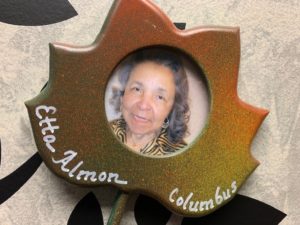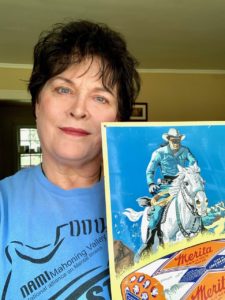Mental Illness and Racism: Etta’s Story
Mental illness and racism have been unwelcome visitors to Etta M. Almon’s 80 years of life. Hard times may have bent Etta but they have not broken her. She is a retired nurse, parent, boxer, and a dedicated board member of the National Alliance on Mental Illness of Ohio (NAMI Ohio).
As with many members of the NAMI family, Almon’s connection to NAMI, the nation’s largest volunteer mental health advocacy organization, is personal. Her son, brother, sister, and uncle have struggled with mental illness over the years.
As an African American, Etta said she realizes there is a “lack of trust and not enough people to provide mental health care in the African American community. We need more education on both sides.” Etta is working to involve minority churches, African American sororities, and medical organizations to improve mental health care in the community.
Etta now lives in Columbus but was born in Georgia where racial inequality was an everyday fact of life. When she was seven years old, she had the terrifying experience of seeing a cross burned in her neighbor’s yard just across the street from her own home. Additionally, stories circulated of black people being lynched, she said. Compounding her fear, Etta’s father was away at the time in Cincinnati where he had gone to find work in a factory.
“We eventually moved to Cincinnati because we were afraid. They said, ‘The next time we’ll kill you.’ The family made the move to Ohio in 1947. Etta still remembers her uncle taking the family to the train station in a horse-drawn wagon.
While things were better in Cincinnati, Etta was unable to escape racism entirely. “There were certain areas in Cincinnati where we weren’t allowed to go unless you worked there. I remember they took us to a park when I was in junior high school and some people started shooting at us.”
While battling racism and inequality, a new battle began. Mental illness began rearing its head in Etta’s family. Her son, Leroy, began showing symptoms when he was in his late 20’s, she said. While he was living in Dayton, her son traveled to Columbus where he was involved in an automobile accident that was seemingly his fault. He arrested because of a conflict with the police, likely due to his mental illness, Etta said. “They beat him severely. He had never been arrested before, didn’t have a record, and had never got in trouble. It was very traumatic for him and for me.”
The trauma of the arrest affected Leroy so severely that he began speaking less and less, and eventually stopped talking altogether. He now lives with her, and only communicates by writing.
Etta also lost her uncle, Ivory Wansley, as a result of untreated mental illness in his 40’s. She said her uncle was taken to jail after having a mental breakdown – and never returned home. He died in jail, apparently as a result of being beaten, she said.
Etta worked 15 years as a nurse in the traumatic head injury department at Ohio State University hospitals. Retired now, she remains active by playing tennis, weightlifting and boxing, an unusual form of exercise she took up at the recommendation of her neurologist. “It helps your balance and helps your mind by how they tell you to follow along.” She is the only woman boxer at TITLE Box Club in Grandview.
Etta said minorities have made strides in civil rights and mental health awareness. “We’ve made some progress, but we’ve got a long way to go.
There’s still a lot of work to be done, but now at least we’re having a discussion about it which is a good thing.”
Etta continues her fight against stigma and inequality in her capacity as a board member of NAMI Ohio. NAMI Ohio is blessed to have Etta help us create change that is so desperately needed. Thank you, Etta!

